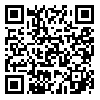

BibTeX | RIS | EndNote | Medlars | ProCite | Reference Manager | RefWorks
Send citation to:
URL: http://jdisabilstud.org/article-1-2065-en.html
Background & Objectives: Multiple sclerosis (MS) is a chronic and incurable disease of the central nervous system. Patients with MS are less likely to find meaning and purpose in life due to physical and mental health problems. They cannot find a way to solve their problems and improve their quality of life and health. One of the most effective and efficient methods of improving psychological indicators and resolving conflicts is positive thinking. This approach is educational and suitable and necessary knowledge for everyone. This method does not consider the individual's background and emphasizes positive and purposeful ethics and ethical thoughts in behavior. Also, it is not costly as using medications. Since MS is one of the major crises in a person's life and the physical and motor complications caused by this disease can affect all aspects of a person's life, this study aimed to evaluate the effectiveness of positive thinking education on the meaning of life in women with MS. They were members of the Gorgan City MS Association, Gorgan City, Iran.
Methods: The present research is a quasi–experimental study with a pretest–posttest design and a control group. The statistical population consisted of all women with MS who had active medical files in the Gorgan MS Association in 2018. The study sample comprised 40 MS patients selected by a convenient sampling method and were randomly divided into experimental and control groups (20 subjects in each). The inclusion criteria were as follows: having multiple sclerosis for at least one year, being older than 20 and younger than 60 years, holding a minimum primary education, lacking physical constraints disrupting their personal care, completing the treatment consent form, not attending individual counseling sessions other than study treatment sessions. The exclusion criteria were as follows: history of hospitalization in psychiatric hospitals, use of psychiatric and psychotropic drugs, any sedatives, alcohol, and drugs. The research tool was the Meaning of Life Questionnaire (Steger et al., 2006), completed by all participants in the pretest and posttest. Positive thinking training sessions were held for the participants of the experimental group in 10 90–minute sessions, while the participants of the control group did not receive any intervention. The obtained data were analyzed by descriptive and inferential statistics in SPSS software version 22. Descriptive data analysis included calculating mean indices and standard deviation, and inferential analysis included performing univariate analysis of covariance. The significance level was considered 0.05.
Results: The results showed that after eliminating the effect of pretest scores, the mean scores of the presence of meaning (p<0.001), search for meaning (p<0.001), and meaning of life (total score) (p<0.001) were significantly different between the experimental group and the control group in the posttest. Also, according to Eta squared coefficients, positive psychotherapy explained 25% of the presence of meaning, 58% of the search for meaning, and 39% of the total score of the meaning of life in women with MS.
Conclusion: According to the study results, positive thinking education is a suitable intervention to increase the meaning of life of women with MS.
| Rights and permissions | |
 |
This work is licensed under a Creative Commons Attribution-NonCommercial 4.0 International License. |


